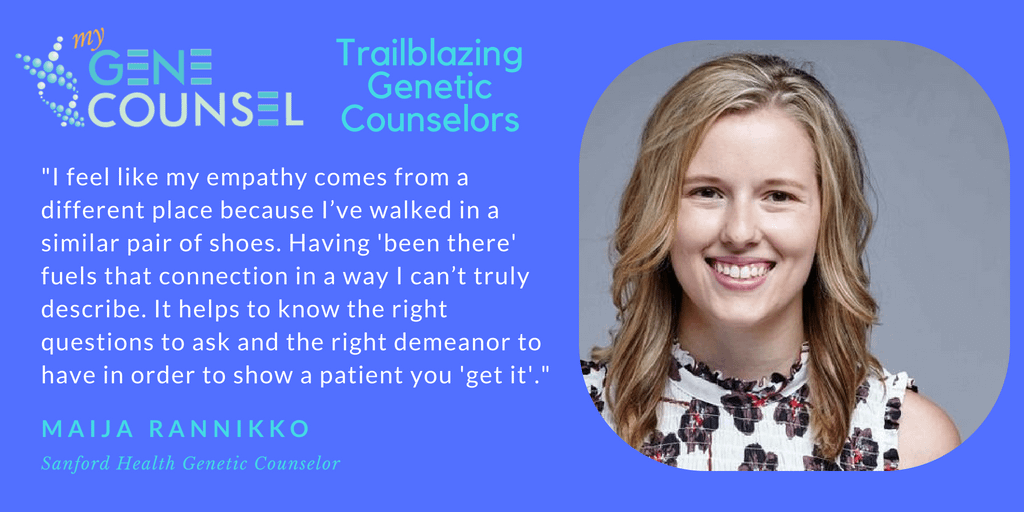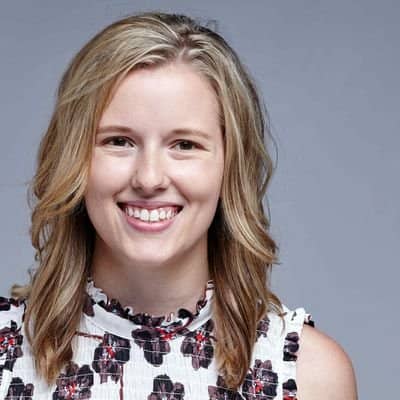To keep updated with conversations and news in genetic counseling you can subscribe to our Twitter list featuring the latest updates from over 575 professionals in the field, all in one stream.
In this installment, we interview genetic counselors who also have personal patience experiences with a rare disease or hereditary cancer syndrome. Stay tuned for the next installment (Part II) as we continue to interview genetic counselors with these experiences.

When did your rare disease journey begin? What challenges and obstacles have you experienced?
I was first diagnosed with Chiari Malformation when I was 12. I was having some problems with my vision and was diagnosed “incidentally” on an MRI. I had the opposite of a diagnostic odyssey because I was diagnosed right away, but as I started progressing it took another 7 years, 4 neurosurgeons, and 4 neurologists before I was treated correctly. It’s hard to find a physician who understands it as something that causes significant symptoms vs. a radiological finding. I had decompression surgery when I was 19 and I’m feeling great. It’s crazy to me that at one point I wasn’t sure if I would finish high school and here I am with a Master’s degree and a full-time job.
During your diagnostic odyssey was a genetic counselor involved? When did you first learn about genetic counseling?
Since Chiari Malformation doesn’t have a clear genetic cause I never met with a genetic counselor. I first heard about genetic counseling through my mom’s co-worker when I was in the career exploration stage of high school.
How do you think your experience would have been different if a genetic counselor had been involved?
A genetic counselor wouldn’t have had an impact on treatment or diagnosis, but I think knowing there wasn’t a clear genetic cause would have helped my parents cope with some of the guilt that comes with having a child with a rare disease—I think there is value in knowing both if a disease is genetic or if it isn’t. I was also at a stage in life where I was acutely aware of what was going on with my health (on top of all the typical teenage girl things), it would have been nice to spend more than 20 minutes with a provider, especially a provider with psychosocial skills.
How did your experience being a patient shape your decision to pursue genetic counseling as a career?
I didn’t have a great experience with healthcare and I don’t think the majority of individuals with a rare disease do—it’s just the nature of the beast. I’ve always felt a sense of “I don’t want what happened to me to happen to another family.” I truly felt called to genetic counseling, to be a positive force in the lives of families who are having their worst day.
Do you think your personal experience has impacted how you communicate with your patients?
It definitely has. I feel like my empathy comes from a different place because I’ve walked in a similar pair of shoes. I always joke that I think I’m “broken” because no patient has made me cry, but spending time with all my amazing families fills me up instead of draining me emotionally. I feel like having “been there” fuels that connection in a way I can’t truly describe.
Have you ever found it appropriate to share your story with a patient?
I haven’t shared my story with a patient. I feel like I can use my experiences in a way that doesn’t bring me directly into the situation. Having the experience helps to know the right questions to ask and the right demeanor to have in order to show a patient you “get it.” Not treating a sick kid like a sick kid goes a long way.
Are you personally involved with any committees/organizations in the rare disease community?
I’ve contributed to two “toolkits” published by Global Genes:
- Keys to Help Rare Disease Patients Ensure A Successful Surgery
- Taking Control: Optimizing Your Potential As A Young Adult With A Rare Disease
Congratulations on your graduation from Augustana-Sanford Genetic Counseling Graduate Program! Can you share with us your new position in the genetic counseling workforce?
I work for Sanford Health as a genetic counselor in the Maternal-Fetal Medicine clinic and I’m part of the Imagenetics initiative. Plus I’ll pay it forward to my program!

My mom was diagnosed with endometrial cancer when I was 12. Her family history along with early-onset cancer led to a genetic counseling referral. She was tested for the three most common Lynch syndrome genes and they found an MSH2 pathogenic mutation.
During the process of being diagnosed, was a genetic counselor involved?
When I started to think about testing in 2015, my mom scheduled appointments for me at three different health care systems, 6 months in advance. All of the appointments were canceled due to schedule changes. I was turning 24 and we were frustrated, so instead of seeing a genetic counselor, I asked my primary care doctor to order the test.
When did you first learn about genetic counseling? How do you think your experience would have been different if a genetic counselor had been involved?
A genetic counseling student visited my AP biology class my senior year of high school to tell us about the field; it struck me right away – this was my ideal career. My testing experience was much better than it could have been since my doctor is wonderful and has taken the time to learn about Lynch syndrome. I have since learned many details about Lynch syndrome from genetic counselors I work with (example: the exact percent risk of developing each type of cancer with an MSH2 mutation) that I could have learned sooner had I seen a genetic counselor in a clinic. A genetic counselor would also have helped me and my family navigate the emotional burden of receiving such a diagnosis.
How did your experience being a patient shape your decision to pursue genetic counseling as a career?
Having a condition like Lynch syndrome obviously isn’t ideal, but I am incredibly grateful to have the diagnosis and the opportunity for cancer prevention. I’ve read that a large majority of people in the United States with hereditary cancer syndromes are undiagnosed; these people need to be identified and given the option of genetic testing. As a genetic counselor, I hope to empower patients by informing them about the benefits of testing and helping them navigate their medical management.
Do you expect your experience will impact how you communicate with your future patients?
As a genetic counseling assistant, I have already encountered many patients who have similar conditions or family histories. I feel more of a connection with them than they know. I think as a genetic counselor, I will have a better understanding of some of the complexities that come with such a diagnosis (family dynamics, undergoing procedures at a young age, the financial burdens of preventative care, etc.)
Are you personally involved with any committees/organizations in the Lynch syndrome community?
I have thought about volunteering with Lynch Syndrome International, but haven’t found the time. I’d like to get involved in the future!
As a rising genetic counselor, how have you been able to be an additional support and resource to your family?
My mom is a doctor and has access to many resources as a result; she’s done a great job of advocating for me (such as getting our insurance to pre-approve my genetic testing). We have not needed additional resources, but as I get into the field I’m sure I’ll make plenty of connections that could be helpful down the road.
Which genetic counseling graduate program will you be attending in the fall? Is there a particular subfield(s) of genetic counseling you hope to specialize in after graduation?
I will be at the University of Pittsburgh and am planning to do their dual degree program with an MS and MPH. As a genetic counseling assistant I have grown to love pediatrics, and of course, I feel a strong connection to cancer. I want to keep an open mind as I explore the field and I hope my MPH will allow me to enter the field with a much-needed public health perspective.

Where did your family’s journey with Transverse Myelitis begin?
Our journey began in February 2011, literally in the middle of the night at our home in Mississippi. My mom woke up suddenly unable to control her body from the neck down. That snowy winter night kicked off three years of seeking answers and healing within specialty hospitals and rehabilitation centers until her passing in April 2014.
How did your mother’s experience shape your decision to pursue genetic counseling as a career? How will it impact how you communicate with your future patients?
I always wanted to create my perfect blend of medicine and social work/counseling (little did I know that it already existed— I just hadn’t discovered it yet!). After going through this with my mom, I saw the value in having a point person that was skilled to handle multiple aspects of a diagnosis— questions about the actual diagnosis, of course, but also the next layer of psychosocial support and guidance. In the frenzy of a new medical challenge, I understand families aren’t always immediately focused on origin, recurrence, or developing healthy coping skills. I remember it feels very much like survival mode when things are unknown and rapidly changing. I like to think I will be a helpful long-term contact for families for when the dust settles and they have questions we can thoughtfully work through together.
As a rising genetic counselor, how have you been able to be an additional support and resource to your family?
Wow! I feel like a much more seasoned advocate for research and support groups because we relied on both of those things to give us hope during such a rare time in our lives. I also love to practice explaining things I’m learning about genetics to them. It helps to reinforce my understanding if I’m able to break it down in a way that’s meaningful. Note: the jury’s still out on the genetics of Transverse Myelitis, but there is a dedicated team at Johns Hopkins studying all aspects of this rare disease. They released information last summer about a homozygous variant identified in two sisters with TM- a really interesting discovery that I’m curious to follow.
Where will you be attending graduate school in the fall? Is there a particular subfield(s) of genetic counseling you hope to specialize in after graduation?
I am headed to the University of South Carolina! I’m a Mississippi State alum, so my current dilemma is wondering if MSU’s maroon is close enough to USC’s garnet red? If not I may need to get a whole new wardrobe. 🙂 Really though, I am so excited to begin this journey! I have the most experience in prenatal and pediatric genetics but am wide open to other subfields. I can’t wait to see where it takes me! Special thanks to Christina Hurst, Laura Hendon, Emily Boothe, Andrew Gunter, and Holly Zimmerman- all fabulous counselors that have invested in me during the last 21 months of my genetic counseling journey.
Stay updated with Olivia on Twitter!
Check out all other episodes of our Trailblazing Genetic Counselors series here. Don’t forget to check back for our next installment for Part II where we interview genetic counselors who also have the patient experience of having a rare disease or hereditary cancer syndrome.
Want to recommend a genetic counselor that deserves the title of Trailblazing Genetic Counselor? Tweet us at @mygenecounsel or email ellen@wordpress-643246-2098057.cloudwaysapps.com!

